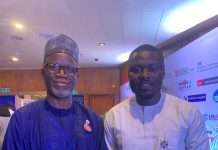Pharm. (Dr) Okey Akpa, says except African countries like Nigeria and others build local vaccine plants, effective vaccination of the continent’s population may not be realised, in the wake of shortage in vaccine supply.
He categorically stated that Nigeria and Africa have a very long way to go to achieve the level of vaccination required for the safety of her citizens and to return the economy to normalcy.
Akpa, who is the CEO of SKG Pharma, made the submission in his keynote address at the webinar organised by the National Institute for Pharmaceutical Research and Development (NIPRD) on improving access to COVID-19 vaccine.
Speaking at the gathering, held via Zoom, he said only two per cents of the doses of the administered COVID-19 vaccines has globally taken place, while more than 2.7 billion doses of COVID 19 vaccines has been administered globally as at June 2021.

He added that collaboration is a must as a multi-dimensional approach is critical for a country like Nigeria noting that international organisations should recognise practitioners by the works they do.
Dr Akpa said this is the time to continue to strengthen the research institutions and national regulatory agencies, such as NIPRD and NAFDAC.
“COVID-19 is a terrible crisis. Let us not waste it! This is the time to take action by way of building not just vaccine plants but building the overall capacity that will ensure medicine security, including vaccine security for our country and continent”
“Open, inclusive, and accountable procurement processes is a requirement to make this happen. Opening the procurement process will enable citizens, civil society, media, and other stakeholders to help inform the planning process, monitor the supply chain, identify corruption risks, and detect irregularities. This will enable governments to manage vaccine resources in the best interest of their citizens,” Akpa added.
Professor Martins Emeje, said there is a need for innovative citizen-centered programmes that would ensure an equitable distribution of vaccines, with a focus on getting to the poorest and marginalised as they reach the middle and upper classes.
He noted that these programmes will need to be transparent on decisions and processes, include citizens in shaping vaccine rollout strategies, and counter vaccine misinformation to reduce any vaccine hesitancy.
“Creating mechanisms for citizens to provide feedback on vaccine distribution and related services. Vaccine registration portals, for example, offer an interesting opportunity to close the feedback loop, allowing citizens to also submit grievances if they are unfairly denied vaccines or experience other issues. OGP countries have shown that enabling citizens to provide feedback is possible. Sekondi-Takoradi in Ghana and Kaduna in Nigeria are leveraging technology to share information with citizens and give feedback on service delivery quality.
“Registration portals should play a vital role in helping governments collect information on who and where citizens have been vaccinated. To allow accountability, this information will need to be shared with citizens in easily readable formats while protecting personal data privacy. The information will need to show areas, gender, and age groups that have been vaccinated. This will enable citizens, civil society, and journalists to hold the government accountable and ensure that the poor and marginalised groups also access vaccines fairly and timely,” he mentioned.
Emeje said that implementing this citizen-centred vaccine rollout approaches will anchor access to improve COVID-19 vaccine and could be Africa’s most significant contribution to the fight against the pandemic; serve as an act against “vaccine apartheid,” signaling the continent’s commitment to making sure no-one is left behind.











